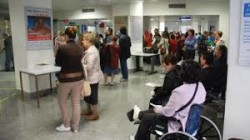Is the waiting worth it? I say yes.
 Many Italians complain about their national health service (SSN) but from the American point of view it is often enviable. Everyone has their own health service doctor whom they can see without charge (a home visit instead costs something), many pharmaceuticals are free of charge as is Emergency care and the state, or rather the region, of which Italy has 20, pays the lion’s share of most diagnostic tests and surgical procedures.
Many Italians complain about their national health service (SSN) but from the American point of view it is often enviable. Everyone has their own health service doctor whom they can see without charge (a home visit instead costs something), many pharmaceuticals are free of charge as is Emergency care and the state, or rather the region, of which Italy has 20, pays the lion’s share of most diagnostic tests and surgical procedures.
Just take my friend Marcello, 72 years old, in good shape despite a recent heart attack, but in need of a hip replacement, possibly two. He is having it tomorrow at a clinic plus rehabilitation center near Florence and he won’t be paying a penny. Furthermore, he also had to wait only a few months for the operation to be scheduled.
Unfortunately, this is not always the case – far from it – and according to a recently-released report on the system’s functioning by a citizens’ group formed to safeguard “the rights of the ill”, the because of this and the rising co-payments -more and more Italians are taking out private insurance policies as well.
Last year, the organization Pit salute received more than 24,000 complaints, but is that really so many in a country of 60 million people?
Almost a fourth of these concerned the long waiting times needed to accede to certain services, as well as the rising co-payments (still insignificant compared to American charges). About 60 percent of those complainants said that their main criticism concerned the waiting time needed for diagnostic exams, appointments with specialists and operations.
In effect, in some parts of the country diagnostic exams and minor operations can require a wait of eight months or more. In 2013 these could range from 11 months for a colonoscopy and 14 months for a mammogram to 20 months and 24 months for a psychiatric visit. One reason for this is poor organization. Another is limited structures in some areas of the country. Furthermore, in recent years, the Regions have to save money by reducing the length of hospital stays, more and more operations are being done on a day-hospital basis, which means, since the number of operating rooms is what it is, that waits have gotten longer. But frankly I have rarely had a problem; in a major city like Rome, there are many private diagnostic centers that accept health system doctor prescriptions and accept the SSN’s co-payments.
The other principal complaint concerned the rising cost of about the co-payments not for operations for hospitalized patients, but for diagnostic tests, doctors’ visits and minor day hospital surgical procedures. These charges once did not exist at all but were introduced (along with charges for some pharmaceuticals, previously all available without charge) largely because inefficiency together with over-use by patients, threw the system, which is organized on a regional basis, deeply (very deeply) into deficit.
Since then the charges have increased sharply. I recently had a bone-density test on the SSN but had to pay a 50-euro co-payment. My private journalists’ heath insurance policy covers that for me so it is not much of a burden. But for ordinary Italians, especially in a time of economic crisis, it is. For MRIs and things of that nature, the so-called “ticket” is considerably higher.
It should be noted that those with low incomes and those with low incomes over 65 are exempted from many of these charges. But they are still too high for most. According to the report mentioned above, the average family now spends 650 euro a year for medicines no longer covered by the SSN, 901 euro for health aids such as vitamins, artificial tears, creams etc., 1070 euro for specialists, 537 euro for prostheses and auxiliary aids, and 737 euro per single-use items such as adult diapers, catheters and so forth. For an average family, this is a lot and leads to complaints that national health is no longer what it should be.


